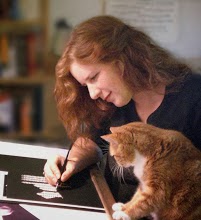I just finished reading 'Proust was a Neuroscientist' by Jonah Lehrer. Not as quick a read as 'Zoobiquity' (Barbara Natterson-Horowicz) but one of those books that would sit on the coffee table or nightstand and just stare at me, beckoning me to pick it up again and read the next chapter.
I find myself fascinated with intersections - East meets West, Tradition meets Innovation, Art meets Science. I would have to say that Lehrer's book is the ultimate Art meets Science study. He reviews the works of avant-garde artists like Cezanne, Igor Stravinsky and of course the titular Proust and discusses, in-depth, why they were so out of place in their own time and field; but also how their work fit in (or rather didn't fit in) to the scientific paradigms of their day. Then he brings it full circle, discussing the advances in scientific knowledge in the field of neuroscience which tell us today that many of the old paradigms were incomplete or downright incorrect, and how those revolutionary artists' ideas were closer to what is the current scientific 'truth'.
It goes both ways - it's amazing what we have learned in the last few decades, and I am very proud of modern science that it is able to grow and adapt, to change its paradigms as new evidence comes forward and not to settle with the status quo when it doesn't answer the questions it's supposed to. However I still get frustrated with those who have tunnel vision - on either side of the fence. Those who can't see that as great as modern science is, it doesn't have all the answers, and those places where it intersects with other areas... Art, Religion, daily empirical experience... are where there are opportunities to learn more. I hold those 'other areas' to the same standard... Art and Religion that refuse to budge or listen to Science are, in my mind, no better. Which is probably why I love the Dalai Lama, a man who can see and discuss the similarities between buddhism and quantum mechanics, who is a religious leader that is not afraid of science but excited about it's potential.
In 'Proust' it seems that Lehrer's main points are how Art may have more to it than many enmeshed in Science like to think. I think there is another dimension though; it is fascinating that those artists - many of whom (if not all) were rejected by their contemporaries in a most derisive way - have come to be regarded as pioneers over time and are now classic icons. I'm sure there are many artists out there who are rejected as untalented or just plain weird who actually ~are~ untalented and weird. Some of the reasons Lehrer discusses may be why with a little time we came to not only accept these radicals, but to exhalt them. They were tapping into some basic human truths, and as a species we love things that feel like they resonate with our humanness.
Or maybe I'm just addicted to finding common ground.
Some days I look at the books I'm reading and wonder if I should have been a psychologist, or philosopher, or neuroscientist. But during more lucid moments I realize that me, being me, might not have been able to enjoy a book like Lehrer's were I an art historian or a neuroscientist. I would get too caught up in all the details in my own head and whether my opinions on his opinions were 'correct' - even though the notion of 'correct opinions' sounds so utterly ridiculous to me at this moment.
So I guess I'm glad I'm not a neuroscientist, though I suddenly feel psychologically introspective again. Maybe I'll go get some Carl Jung books out of the library (though my husband might kill or divorce me if I start talking about cognitive function theory again :D), and I'll see what else grabs my eye while I'm there, and I'll continue to investigate these intersections and marvel at the world around me. At least until 'Last Ape Standing' comes out... good thing I'm not a paleoanthropologist!
~ Pb
Sunday, January 20, 2013
Subscribe to:
Post Comments (Atom)






No comments:
Post a Comment